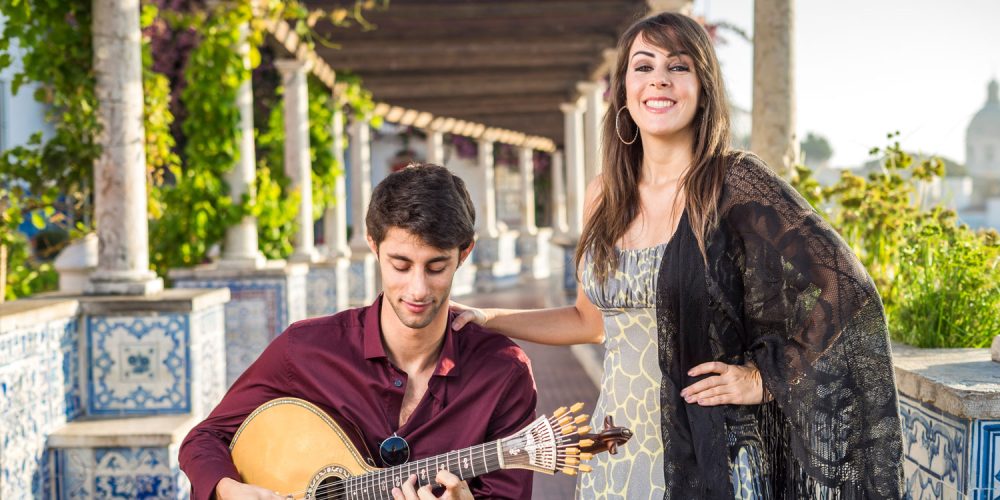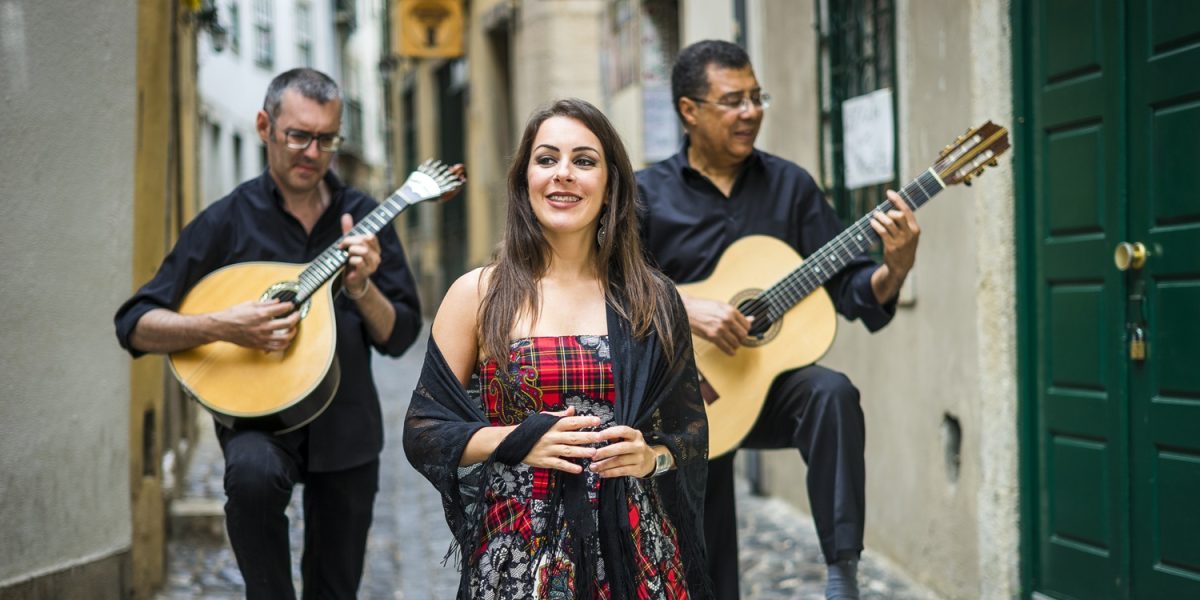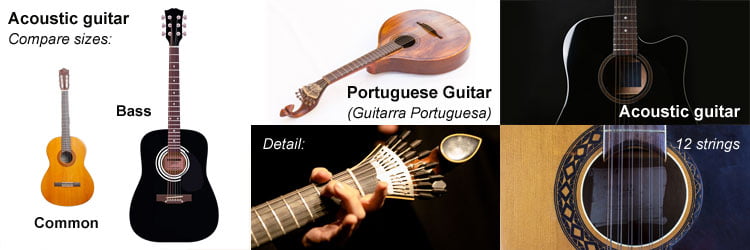
Fado music is a deeply expressive genre of Portuguese singing that is often associated with pubs, cafés, and restaurants. It officially originated in Portugal around the 1820s, although its roots may extend even further back in time. Fado captures profound melancholy and emotions, reflecting the realities of everyday life. Typically, a female or male vocalist performs fado, accompanied by one or two guitarras (10- or 12-string guitars), one or two violas (6-string guitars), and sometimes a viola baixo (a small 8-string bass viola). The lyrics are arranged in quatrains or other common Portuguese poetic forms, and the music aims to evoke a sense of *saudade*—a yearning or longing. There are two distinct styles of fado: the older Lisbon style and the younger Coimbra style. Lisbon fado emerged in the Alfama district, while Coimbra fado has its roots in the north-central Portuguese city of Coimbra⁴⁵.
(3) Fado: Discover Traditional Portuguese Music | Portugal | Viking. https://www.youtube.com/watch?v=sFjeMZomano.
(4) Fado-The Soul of Portugal. https://www.youtube.com/watch?v=on9lKHZc5jA.
(5) What is fado music?. https://www.youtube.com/watch?v=DIseKiOOfPM.

Fado band performing traditional portuguese music on the narrow street of Alfama, Lisbon, Portugal
Fado, the soulful music of Portugal, has a fascinating history that intertwines with the streets of Lisbon and the lives of its people. Let’s delve into its origins:
Early 19th Century: Fado emerged as a musical expression in the narrow streets of Alfama, Lisbon’s oldest neighborhood. It found its voice in convivial and leisure moments, often happening spontaneously indoors or outdoors—places like gardens, bullfights, streets, taverns, and cafés.
Social Context: Initially, fado was associated with marginalized communities—prostitutes, sailors, coachmen, and rough characters. Singers were often described as “faia,” with hoarse voices and tattoos, speaking in slang.
Maria Severa Onofriana: One of the greatest myths in fado history revolves around the amorous relationship between Count Vimioso and Maria Severa Onofriana, a prostitute renowned for her singing talents. This story became immortalized in poems, cinema, and visual arts.
Teatro de Revista: Around 1870, fado entered the Teatro de Revista, a vaudeville theater genre born in Lisbon. It animated the Revista, with famous actresses and renowned fado singers performing their repertoires.
Two Approaches: Fado took two distinct forms: the danced fado stylized by Francis and the spoken fado of João Villaret.
Characteristics: Fado is renowned for its expressive and profoundly melancholic character. Singers address the harsh realities of everyday life, sometimes with resignation.
Origins: The exact origins are debated—some believe it came from West African dances in Brazil, while others associate it with Portuguese seafarers or the Moorish occupation of Portugal.
In summary, fado’s roots lie in Lisbon’s streets, its marginalized communities, and the poignant narratives of love, loss, and longing.
Fado, the soulful music of Portugal, has two distinct styles:
Origins: Lisbon fado emerged in the first half of the 19th century, following the return of the Portuguese government from Brazil during the Napoleonic Wars. It arose in Lisbon’s Alfama district—a socially and economically marginalized area that blended Iberian, South American (particularly Brazilian), and African influences.
Characteristics:
– Rooted in marginality and transgression, Lisbon fado reflects the times when censorship impacted urban entertainment.
– Often performed in bars frequented by sailors and prostitutes.
– Lyrics touch on themes of love, nostalgia, and saudade (a deep emotional longing).
– Accompanied by one or two guitarras (10- or 12-string guitars), violas (6-string guitars), and sometimes a viola baixo (a small 8-string bass viola).
– Repertoire follows a duple meter, with lyrics arranged in quatrains or other Portuguese poetic forms.
– Historically featured improvisation.
– Aims to evoke saudade—a yearning for something lost or unattainable.
Origins: Coimbra fado has its roots in the north-central Portuguese city of Coimbra, known for its university.
Characteristics:
– Often associated with an academic and refined style.
– Typically features male singers.
– Lyrics may address themes of love, longing, and tradition.
– Accompanied by similar instruments as Lisbon fado.
– Less improvisational than Lisbon fado.
– Evokes a sense of nostalgia and cultural heritage.
Both styles contribute to the rich tapestry of fado, capturing the essence of Portugal’s emotions and history.
https://media.gettyimages.com/id/1221460597/photo/yellow-vintage-tram-on-the-street-in-lisbon-portugal.jpg?b=1&s=612×612&w=0&k=20&c=WBUQpfTbYu_vh8YEhsIa9QaskWz2CFWZI8qB7EcVjYw=.
https://media.gettyimages.com/photos/view-on-the-old-university-city-of-coimbra-and-the-medieval-capital-picture-id1205728810?b=1&k=20&m=1205728810&s=612×612&w=0&h=9puwJpHIDZgzsQvLphUUmUUnm9wWSr54Bv_AgZ_9CmA=.

Fado instruments
**Fado music** often features the following instruments:
– A plucked string instrument with twelve steel strings, arranged in six courses of two strings each.
– Iconically associated with fado.
– Still uses watch-key or Preston tuners.
– Descendant of the Medieval citole, it has been part of Portuguese musical tradition since the thirteenth century.
– Evolved over time, maintaining its characteristic finger technique and string tuning.
– **Role in Fado:** The Portuguese guitar provides melodic accompaniment, adding a distinctive sound to fado performances.
– Often one or two 12-string guitars are used.
– Provides harmonic support and rhythm.
– Essential for creating the fado’s emotional backdrop.
– Sometimes included in fado ensembles.
– Adds depth and resonance to the overall sound.
– Typically an 8-string bass guitar.
In recent years, fado recordings have expanded to include piano, violin, accordion, and other instruments, blending traditional elements with new sounds. ❤️¹²³⁴⁵
Bron: Gesprek met Copilot 9/6/2024
(1) Portuguese guitar – Wikipedia. https://en.wikipedia.org/wiki/Portuguese_guitar.
(2) The Soul of Portugal: Fado Music Explained – andginja. https://andginja.com/guides/the-soul-of-portugal-fado-music-history-and-significance.
(3) Fado – The Soul of Portuguese Music | Portugal Online. https://portugalonline.com/portuguese-music/fado-soul-portuguese-music.
(4) The Passionate Story of Fado | World Music Central. https://worldmusiccentral.org/2018/12/15/the-passionate-story-of-fado/.
(5) Fado | Portuguese Folklore, Lyrics & History | Britannica. https://www.britannica.com/art/fado.
Fado lyrics** are an essential part of this soulful Portuguese music genre. Let’s explore them:
– Fado lyrics often delve into profound emotions—love, longing, nostalgia, and saudade (a deep emotional yearning).
– They reflect the human experience, capturing both joy and sorrow.
– The melancholic tone resonates with listeners, even if they don’t understand the language.
Traditional fado songs address themes such as:
Saudade: A longing for something lost or unattainable.
Destiny and Fate: The word “fado” itself comes from the Latin word “fatum,” meaning destiny or fate.
Urban Life: Lyrics often depict life in Lisbon’s narrow streets, the sea, and the struggles of everyday people.
Love and Heartbreak: Romantic love, unrequited love, and heartache are common themes.
Here are a few lines from the iconic fado song “Fado Português” by Amália Rodrigues:
When the wind barely blows
And the sky and the sea extended
On the side of a sailboat
On a sailor’s chest…
– Contemporary fado artists continue to write new lyrics, exploring modern themes while honoring tradition.
– Lyrics may touch on social issues, personal struggles, or universal emotions.
Remember, even if you don’t understand the words, listening to fado can evoke powerful feelings. It’s an experience that transcends language. ❤️¹²⁷
Bron: Gesprek met Copilot 9/6/2024
(1) Fado: Portugal’s soulful, mournful, and incredibly moving music. https://www.portugalist.com/fado/.
(2) Fado Song Lyrics. https://www.lyrics.com/style/Fado.
(3) Amália Rodrigues – Fado Portugues Lyrics | Lyrics.com. https://www.lyrics.com/lyric/18420186/Am%C3%A1lia+Rodrigues/Fado+Portugues.
(4) Fadó lyrics and chords – Clannad – SongsInIrish.com. https://songsinirish.com/?song=fado-lyrics.
(5) Milky Chance – Fado Lyrics | Lyrics.com. https://www.lyrics.com/lyric/36556064/Milky+Chance/Fado.
(6) Amália Rodrigues – Fado Português (English translation). https://lyricstranslate.com/en/fado-portugues-portuguese-fado.html.
(7) Milky Chance – Fado (Official Video) – YouTube. https://www.youtube.com/watch?v=81FeO35TYqQ.
(8) Clannad – Fadó Lyrics | Genius Lyrics. https://genius.com/Clannad-fado-lyrics.
(9) Milky Chance – Fado Lyrics | Genius Lyrics. https://genius.com/Milky-chance-fado-lyrics.
(10) undefined. https://milky-chance.lnk.to/fado.
(11) undefined. http://milky-chance.lnk.to/mindthemoon.
(12) undefined. https://milky-chance.lnk.to/fadoGet.
(13) Milky Chance – Fado (Lyric Video) – YouTube. https://www.youtube.com/watch?v=Tw1uKd7CtAM.
Fado, the soulful music of Portugal, has produced many iconic songs over the years. Here are some famous fado songs and their remarkable performers:
| Song | Singer | About | Watch |
|---|---|---|---|
| Barco Negro (Black Boat) |
Amália Rodrigues | A hauntingly beautiful song that captures the essence of longing and melancholy. | YouTube |
| Uma Casa Portuguesa (A Portuguese House) |
Amália Rodrigues | Celebrates the simple joys of home and the warmth of Portuguese culture. | YouTube |
| Nem às Paredes Confesso (Nor to the Walls I Confess) |
Amália Rodrigues | A passionate and emotional fado that speaks of secrets and unspoken feelings. | YouTube |
| Coimbra | Amália Rodrigues | An ode to the city of Coimbra, known for its university and romantic charm. | YouTube |
| Triste Sorte (Sad Luck) |
João Ferreira Rosa | Reflects on fate and the twists of life. | YouTube |
| Embuçado (Mysterious Person with Capped Face) |
João Ferreira Rosa | Evokes intrigue and hidden emotions. | YouTube |
| Gente da Minha Terra (People of My Land) |
Mariza | Celebrates the connection to one’s homeland. | YouTube |
| Bairro Alto | Carlos do Carmo | Pays homage to Lisbon’s vibrant Bairro Alto neighborhood. | YouTube |
| Lisboa Menina e Moça (Lisbon is a Girl and Maiden) |
Carlos do Carmo | A love letter to Lisbon. | YouTube |
| Andorinhas (Swallows) |
Ana Moura | A poetic reflection on fleeting moments. | YouTube |
Remember, fado is more than music—it’s an emotional journey through Portugal’s soul.
https://www.youtube.com/watch?v=on9lKHZc5jA.
https://www.youtube.com/watch?v=RY66q43G63Y.
(5) Fado – A one hour long compilation – YouTube. https://www.youtube.com/watch?v=Ved_vBZSY2w.
(6) Best of Amalia Rodrigues : Queen of Fado. https://www.youtube.com/watch?v=Oih72wBaI0E.
(7) Fado – Greatest Hits – Compilation by Various Artists | Spotify. https://open.spotify.com/album/7EkgkYsYTmqH4b3sTl5NFk.
If you’re in Portugal and want to immerse yourself in the soulful sounds of **fado music**, here are some fantastic venues and cafés where you can experience this authentic tradition:
R. do Ateneu Comercial 32 in Porto
A collective of professional fado artists offering independent concerts with a traditional style.
Intimate atmosphere, great acoustics, and a chance to chat with the singers.
Website
Ideal Clube de Fado Tickets
Avenida Vimara Peres 49 Vila Nova de Gaia 4000-545
Features some of the best local fado voices. Affordable price, no obligation to spend on dinner or drinks. Includes a glass of port wine for a complete experience.
Website
Rua Sao Sebastiao 25 Vila Nova de Gaia 4050-568
One of the oldest fado houses in Porto. Enjoy professional and amateur singers while savoring traditional Portuguese food. Located near the Cathedral of Porto in the Sé District.
Website
Rua Outeirinho 13, Próximo do Palácio da Bolsa Vila Nova de Gaia 4050-450
Maintains the tradition of live fado. A restaurant where you can listen to this moving music. Explore the rich history of fado in this cozy setting.
Website
Remember, fado isn’t just music—it’s an emotional journey through Portugal’s heart and soul.
Traditional fado concerts are a wonderful way to experience this soulful music. Here are some options:
These intimate venues specialize in live fado performances. You’ll find professional fado singers accompanied by skilled musicians. Many fado houses serve traditional Portuguese cuisine, creating a complete cultural experience.
Some theaters and concert halls host fado concerts. Check local listings for upcoming performances. These larger venues offer a different ambiance but still showcase the beauty of fado.
https://www.realfadoconcerts.com/
https://fadocomhistoria.com/
https://www.coliseu.pt/
All:
Portugal hosts various fado festivals throughout the year. Keep an eye out for events featuring renowned fado artists. Festivals often celebrate both traditional and contemporary fado.
https://fadoinchiado.com/
https://fadonabaixa.com/
Remember, whether in a cozy fado house or a grand theater, the emotional power of fado remains unchanged.